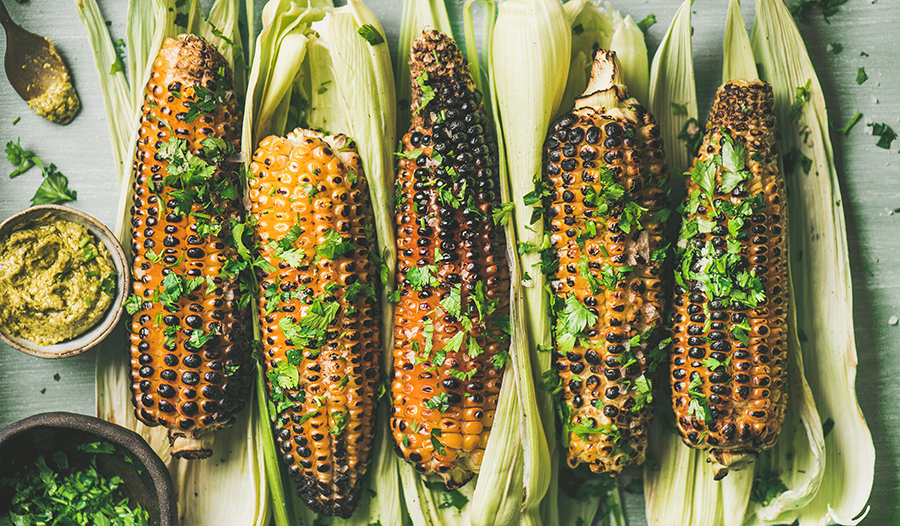3 Dietitian-Approved Meatless Recipes for the Grill

If you follow a plant-based diet, grilling may not be something that you do too often. However, grilling up some meatless meals is a great way to add some variety to your diet, while helping you stick to your eating plan through the warm-weather seasons.
Here are three crowd-pleasing meatless meals that will shine at your next backyard barbecue, along with some of our recommendations for supplements to help you optimize your plant-based diet and be at your best.
Tofu and Vegetable Kebabs
These vegan kebabs are packed with complete protein from the tofu, and the variety of vegetables provide antioxidants, unique textures, and bright flavors. Marinating the veggies overnight in an olive oil marinade really makes these kebabs burst with flavor. Pair the kebabs with a grain-based salad like tabbouleh.
Ingredients:
- 12 ounces extra-firm tofu
- 8 ounces of whole fresh mushrooms
- 2 bell peppers, cut into 1-inch squares
- 8 ounces of cherry tomatoes
- Purple onion, cut into 1-inch chunks
- 1/4 cup olive oil
- Salt and pepper, to taste
- Garlic powder, to taste
- Red pepper flakes, to taste
- Balsamic vinegar, for drizzling
You will also need some bamboo skewers, preferably that have been soaked in water prior to assembling the kebabs. This will help keep them from catching fire on the grill.
Instructions:
- First, prepare the marinade. Whisk the olive oil, salt and pepper, garlic powder, and red pepper flakes together. Set aside.
- Press the tofu to remove as much water as you can, then cut it into cubes.
- Assemble the kebabs by alternating pieces of tofu, mushrooms, bell pepper pieces, cherry tomatoes, and purple onion chunks on the skewers. Put the kebabs in a large dish and pour the marinade over them. Refrigerate overnight or for a few hours to allow the flavors to develop.
- On a hot grill, grill the kebabs for about 15 minutes, flipping them as needed to prevent burning.
- Drizzle with a bit of balsamic vinegar prior to serving. Makes enough kebabs to serve 2-4 people.
Grilled Mushroom Burger
Burgers are a quintessential summer food, perfect for the grill. These vegan burgers are made with portobello mushroom tops that are marinated in a flavorful avocado oil and coconut aminos marinade. Portobello mushroom tops are perfectly patty-sized, have a meaty texture, and are loaded with health-boosting nutrients and antioxidants. Enjoy these burgers with sweet potato fries for a perfect sweet-and-salty combo.
Ingredients:
- 2 portobello mushroom caps
- 1/8 cup avocado oil, plus extra to brush on the hamburger buns (optional)
- 1/8 cup coconut aminos
- Pepper, to taste
- 2 slices vegan cheese (or regular cheese, if vegetarian)
- 2 multigrain hamburger buns
- Your favorite condiments and toppings, like vegan mayo, mustard, pickles, onion, lettuce, tomatoes, or avocado
Instructions:
- Mix up the avocado oil, coconut aminos, and pepper and brush this marinade on both sides of the mushroom caps. Refrigerate the mushroom caps for at least a few hours, but overnight if possible to allow the flavors to develop. Reserve the extra marinade for basting.
- Grill the mushroom caps on a hot grill for about 5 minutes on each side or until the mushroom is fully cooked and tender. If they get too dry, brush them with the extra marinade to prevent burning. Add cheese to the mushroom caps and allow it to melt slightly before removing them from the grill.
- Optional: brush some avocado oil on the flat sides of the hamburger buns and grill them for just a minute or two.
- Add your preferred condiments and toppings to the burgers and enjoy. Makes 2 burgers.
Mexican Street Corn Tacos
These vegetarian Mexican street corn tacos start with grilled corn on the cob, then you mix up the grilled corn with some creamy, melty cheese and sour cream and top it with flavorful cilantro and lime. Pair with a side of black beans to make sure you’re getting plenty of protein.
Ingredients:
- 2 whole corn cobs, with the husks on
- 2 Tbs. sour cream
- 2 ounces Cotija cheese
- 1/4 cup chopped cilantro
- 1 tsp. chili powder
- Salt and pepper, to taste
- 4 tortillas or wraps
- 1 lime, cut into wedges
Instructions:
- Grill the corn in its husk for about 30 minutes, rotating it as needed to prevent burning. Once the corn cools, remove it from the husks and cut the corn off of the cob into a medium-sized bowl.
- Add the sour cream, Cotija cheese, cilantro, chili powder, salt, and pepper and combine well.
- Serve the filling on warm tortillas. Garnish with extra cilantro and fresh lime juice, if desired. Makes 4 tacos.
Meeting Your Nutritional Needs as a Vegan
Plant-based food can be delectable, but you should also consider adding some supplements to optimize your health—especially if you follow a strictly vegan lifestyle. Here are some of my recommendations:
Vitamin B12
Vitamin B12 is only found in animal sources, so it’s important to supplement it if you’re following a vegan diet. Vitamin B12 deficiency can cause fatigue, anemia, and weakness, and unfortunately, it is a common deficiency for vegans because there are no vegan foods that are natural sources of vitamin B12.
Luckily, this can easily be solved by taking a daily vitamin B12 supplement. Another option is to add nutritional yeast to your food. It’s a vegan seasoning with a rich, cheesy flavor, and it’s often fortified with vitamin B12. Adding just one tablespoon a day of nutritional yeast to your food should provide plenty of vitamin B12.
Vitamin D and Vitamin K2
Vitamin D and vitamin K2 both play a hugely important role in keeping your bones strong and healthy. Unfortunately, it can be difficult to get enough of these key nutrients on a vegan diet, so supplementation is a great idea. Vitamin D regulates your calcium level, playing a key role in bone health. Vitamin D also has some important roles in immune support and may help boost your mood.
Some good vegan food sources of vitamin D include mushrooms, fortified cereals, and fortified plant-based milk. However, your body can also synthesize vitamin D on its own if you spend enough time in the sun. Aim to spend about 30 minutes outside every day if you can—but make sure to wear sunscreen!
Vitamin K2 works with vitamin D to strengthen your bones. Vegan food sources of this vitamin include fermented foods like natto (fermented soy), sauerkraut, and kombucha. Plenty of supplements provide both vitamin D and vitamin K2 in one convenient dose.
Iron
Iron is another vitamin that may be good to supplement if you’re on a vegan diet. Although there are many vegan food sources of iron, the body actually absorbs plant iron less efficiently than iron from animal sources like meat or milk. Iron is a key component in red blood cells, so it's important that your body has enough. Iron deficiency can cause symptoms like fatigue and weakness.
Some vegan sources of iron include nuts, seeds, and beans, and dark leafy greens. To boost your iron absorption from these foods, you can pair them with foods that are rich in vitamin C, like tomatoes, peppers, or citrus fruits. You can also cook in cast iron, which is a natural way to impart some extra iron in your food. If you want to make sure you’re getting adequate iron, you can also take an iron supplement.
Zinc
Zinc is another important nutrient. It’s needed for over 300 enzymes that control biochemical processes in the body. Like iron, it’s present in plant foods but easier to absorb from animal foods. Some vegan sources of zinc include nuts, seeds, beans, and fortified breads and cereals. However, because it can be difficult for vegans to get enough zinc, it’s a good idea to include a zinc supplement in your daily routine.
Do Vegans Need Supplements?
Technically, your vegan diet can be perfectly healthy and meet all of your needs without supplements, as long as it's carefully planned. You will definitely need to include nutritional yeast to get enough vitamin B12 in your diet, but your other needs can be met through carefully including a variety of vegan foods—like fortified grains, nuts and seeds, beans, dark leafy greens, and fermented foods. However, supplementing can give you some peace of mind that even if your plant-based diet is not perfect, you are getting what you need to optimize your nutrition.
References:
- https://www.ncbi.nlm.nih.gov/pubmed/24667752
- https://www.ncbi.nlm.nih.gov/pubmed/30901909
- https://www.ncbi.nlm.nih.gov/pubmed/25516361
- https://www.ncbi.nlm.nih.gov/pubmed/27880062
- https://www.ncbi.nlm.nih.gov/pubmed/28189173
- http://ncbi.nlm.nih.gov/pubmed/25048971
- https://academic.oup.com/jn/article/130/5/1437S/4686409
DISCLAIMER:This Wellness Hub does not intend to provide diagnosis...
















































































 Table of Contents
Table of Contents


